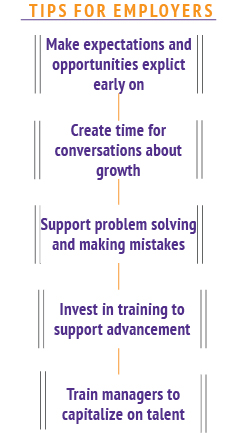Over the past few years, Commonwealth Corporation has been studying the underlying causes of the decline in youth employment. In 2013, we published two studies with the Center for Labor Markets & Policy at Drexel University: Signaling Success: Boosting Teen Employment Prospects and Building Blocks of Labor Market Success. These studies looked at the skills, knowledge and behaviors that businesses were seeking in entry-level workers. We recently took the next step to understand how to prepare young workers and entry-level workers to navigate their careers and prepare and present themselves for advancement opportunities. We conducted this research in two phases: phase one focused on input from businesses and phase two centered on input from young adults.
 For phase one of the research, we surveyed businesses regarding how they assess entry-level workers for their potential for advancement as well as the internal policies and practices around promotions. We followed up the surveys with focus groups and interviews with businesses to test and flesh out the survey findings. Altogether we reached more than 230 businesses from a range of industries and across every region of the Commonwealth of Massachusetts.
We are excited to release a preview of the findings from the business phase of our research in the form of tips and best practices for businesses on developing entry-level talent, for programs that serve young workers, and for entry-level employees themselves. Our first “tips” tool, “Promoting Success: Tips for Employers” is directed toward businesses. We hope that you find the research and findings useful as you recruit and develop talent, particularly in today’s very tight labor market.
Currently we are wrapping up phase two of the study; we are conducting focus groups of young workers 18-24 to understand how they make career decisions and what tools they use to inform those decisions. We have produced another tool for organizations working to prepare young people for work: Promoting Success: Tips for Youth Organizations, and we expect to release findings from phase two and a full report in the fall.
For phase one of the research, we surveyed businesses regarding how they assess entry-level workers for their potential for advancement as well as the internal policies and practices around promotions. We followed up the surveys with focus groups and interviews with businesses to test and flesh out the survey findings. Altogether we reached more than 230 businesses from a range of industries and across every region of the Commonwealth of Massachusetts.
We are excited to release a preview of the findings from the business phase of our research in the form of tips and best practices for businesses on developing entry-level talent, for programs that serve young workers, and for entry-level employees themselves. Our first “tips” tool, “Promoting Success: Tips for Employers” is directed toward businesses. We hope that you find the research and findings useful as you recruit and develop talent, particularly in today’s very tight labor market.
Currently we are wrapping up phase two of the study; we are conducting focus groups of young workers 18-24 to understand how they make career decisions and what tools they use to inform those decisions. We have produced another tool for organizations working to prepare young people for work: Promoting Success: Tips for Youth Organizations, and we expect to release findings from phase two and a full report in the fall.
 For phase one of the research, we surveyed businesses regarding how they assess entry-level workers for their potential for advancement as well as the internal policies and practices around promotions. We followed up the surveys with focus groups and interviews with businesses to test and flesh out the survey findings. Altogether we reached more than 230 businesses from a range of industries and across every region of the Commonwealth of Massachusetts.
We are excited to release a preview of the findings from the business phase of our research in the form of tips and best practices for businesses on developing entry-level talent, for programs that serve young workers, and for entry-level employees themselves. Our first “tips” tool, “Promoting Success: Tips for Employers” is directed toward businesses. We hope that you find the research and findings useful as you recruit and develop talent, particularly in today’s very tight labor market.
Currently we are wrapping up phase two of the study; we are conducting focus groups of young workers 18-24 to understand how they make career decisions and what tools they use to inform those decisions. We have produced another tool for organizations working to prepare young people for work: Promoting Success: Tips for Youth Organizations, and we expect to release findings from phase two and a full report in the fall.
For phase one of the research, we surveyed businesses regarding how they assess entry-level workers for their potential for advancement as well as the internal policies and practices around promotions. We followed up the surveys with focus groups and interviews with businesses to test and flesh out the survey findings. Altogether we reached more than 230 businesses from a range of industries and across every region of the Commonwealth of Massachusetts.
We are excited to release a preview of the findings from the business phase of our research in the form of tips and best practices for businesses on developing entry-level talent, for programs that serve young workers, and for entry-level employees themselves. Our first “tips” tool, “Promoting Success: Tips for Employers” is directed toward businesses. We hope that you find the research and findings useful as you recruit and develop talent, particularly in today’s very tight labor market.
Currently we are wrapping up phase two of the study; we are conducting focus groups of young workers 18-24 to understand how they make career decisions and what tools they use to inform those decisions. We have produced another tool for organizations working to prepare young people for work: Promoting Success: Tips for Youth Organizations, and we expect to release findings from phase two and a full report in the fall.
